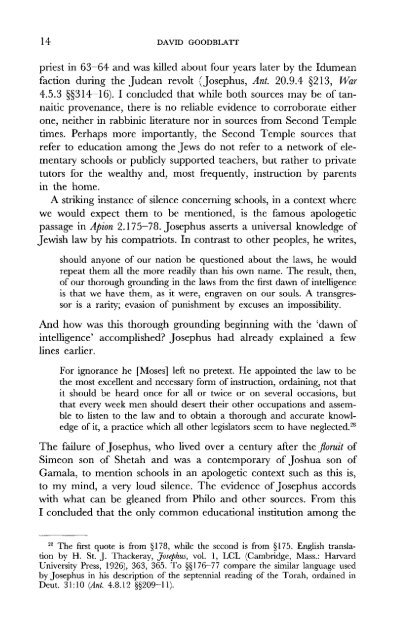historical perspectives: from the hasmoneans to bar kokhba in light ...
historical perspectives: from the hasmoneans to bar kokhba in light ...
historical perspectives: from the hasmoneans to bar kokhba in light ...
You also want an ePaper? Increase the reach of your titles
YUMPU automatically turns print PDFs into web optimized ePapers that Google loves.
14 DAVID GOODBLATT<br />
priest <strong>in</strong> 63-64 and was killed about four years later by <strong>the</strong> Idumean<br />
faction dur<strong>in</strong>g <strong>the</strong> Judean revolt (Josephus, Ant. 20.9.4 §213, War<br />
4.5.3 §§314-16). I concluded that while both sources may be of tannaitic<br />
provenance, <strong>the</strong>re is no reliable evidence <strong>to</strong> corroborate ei<strong>the</strong>r<br />
one, nei<strong>the</strong>r <strong>in</strong> rabb<strong>in</strong>ic literature nor <strong>in</strong> sources <strong>from</strong> Second Temple<br />
times. Perhaps more importantly, <strong>the</strong> Second Temple sources that<br />
refer <strong>to</strong> education among <strong>the</strong> Jews do not refer <strong>to</strong> a network of elementary<br />
schools or publicly supported teachers, but ra<strong>the</strong>r <strong>to</strong> private<br />
tu<strong>to</strong>rs for <strong>the</strong> wealthy and, most frequently, <strong>in</strong>struction by parents<br />
<strong>in</strong> <strong>the</strong> home.<br />
A strik<strong>in</strong>g <strong>in</strong>stance of silence concern<strong>in</strong>g schools, <strong>in</strong> a context where<br />
we would expect <strong>the</strong>m <strong>to</strong> be mentioned, is <strong>the</strong> famous apologetic<br />
passage <strong>in</strong> Apion 2.175-78. Josephus asserts a universal knowledge of<br />
Jewish law by his compatriots. In contrast <strong>to</strong> o<strong>the</strong>r peoples, he writes,<br />
should anyone of our nation be questioned about <strong>the</strong> laws, he would<br />
repeat <strong>the</strong>m all <strong>the</strong> more readily than his own name. The result, <strong>the</strong>n,<br />
of our thorough ground<strong>in</strong>g <strong>in</strong> <strong>the</strong> laws <strong>from</strong> <strong>the</strong> first dawn of <strong>in</strong>telligence<br />
is that we have <strong>the</strong>m, as it were, engraven on our souls. A transgressor<br />
is a rarity; evasion of punishment by excuses an impossibility.<br />
And how was this thorough ground<strong>in</strong>g beg<strong>in</strong>n<strong>in</strong>g with <strong>the</strong> 'dawn of<br />
<strong>in</strong>telligence' accomplished? Josephus had already expla<strong>in</strong>ed a few<br />
l<strong>in</strong>es earlier.<br />
For ignorance he [Moses] left no pretext. He appo<strong>in</strong>ted <strong>the</strong> law <strong>to</strong> be<br />
<strong>the</strong> most excellent and necessary form of <strong>in</strong>struction, orda<strong>in</strong><strong>in</strong>g, not that<br />
it should be heard once for all or twice or on several occasions, but<br />
that every week men should desert <strong>the</strong>ir o<strong>the</strong>r occupations and assemble<br />
<strong>to</strong> listen <strong>to</strong> <strong>the</strong> law and <strong>to</strong> obta<strong>in</strong> a thorough and accurate knowledge<br />
of it, a practice which all o<strong>the</strong>r legisla<strong>to</strong>rs seem <strong>to</strong> have neglected. 28<br />
The failure of Josephus, who lived over a century after <strong>the</strong> floruit of<br />
Simeon son of Shetah and was a contemporary of Joshua son of<br />
Gamala, <strong>to</strong> mention schools <strong>in</strong> an apologetic context such as this is,<br />
<strong>to</strong> my m<strong>in</strong>d, a very loud silence. The evidence of Josephus accords<br />
with what can be gleaned <strong>from</strong> Philo and o<strong>the</strong>r sources. From this<br />
I concluded that <strong>the</strong> only common educational <strong>in</strong>stitution among <strong>the</strong><br />
28 The first quote is <strong>from</strong> §178, while <strong>the</strong> second is <strong>from</strong> §175. English translation<br />
by H. St. J. Thackeray, Josephus, vol. 1, LCL (Cambridge, Mass.: Harvard<br />
University Press, 1926), 363, 365. To §§176-77 compare <strong>the</strong> similar language used<br />
by Josephus <strong>in</strong> his description of <strong>the</strong> septennial read<strong>in</strong>g of <strong>the</strong> Torah, orda<strong>in</strong>ed <strong>in</strong><br />
Deut. 31:10 (Ant. 4.8.12 §§209-11).

















